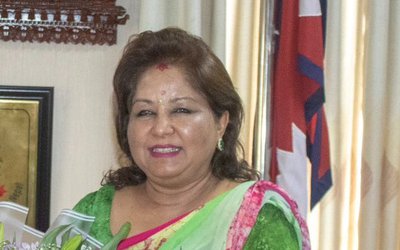Democracy came to Nepal as a bitter victory. After ten years of The Nepalese Civil War (dubbed the People’s War by the Maoists) and the death of almost 15000, the Comprehensive Peace Agreement finally brought peace and democracy to the country at great cost. Perhaps the Maoists were alone when they prompted the violent revolt, but they proved that they had the country’s support when monarchy was abolished by popular vote. That momentum however has now been long lost, and very little progress has been made since the signing of the CPA. Now with only a few weeks left until the deadline for the constitution, many wonder whether it is going to end up as an empty promise.
Democracy, equality and freedom are often trumpeted as goals that make up the noble ideal of the Maoists. If they really mean these, there is a clear lack of disparity between their words and actions. In fact, what the Maoist leaders are doing directly undermine democracy. A 2006 BBC interview with Pushpa Kamal Dahal Prachanda sees him saying that UCPN-Maoist will be willing to work together with other political parties towards peace and prosperity. What has happened in reality however is that the Maoists have made every extra effort to make sure that they have a better standing than their counterparts. The recent cabinet reshuffle, alongside the one in May are testimony to this. By consolidating the position of their political elite, the Maoists are contradicting their own goal of putting an end to what they called “feudal rule”. If they had any sort of political credibility and social capital five years ago, they have now run out of both. Although August 31st signifies the end of the constitutional period, the Maoists seem to be set to dominate the political scenes after the extended deadline. There certainly is no honour in preserving power through non-democratic means.
There is no honour in not keeping a promise either. Even though UCPN-M has promised to pursue peaceful ways, they have a less-than-perfect record in contributing to the peace process, which is at the crux of the constitution that everyone is waiting for. Janardan Sharma, an ex-commander who has shed his weapons in favour of joining political ranks and is now a member of the Special Committee for Peace and Reintegration, attributes the lack of progress to disagreements between the political parties. Remaining loyal to the familiar line of rhetoric, he also underscores peace and advancing the interests of Nepali people as their ultimate objective, but makes it clear that “not only the soldiers, but the whole people will revolt” if the above goals are not fulfilled. This is certainly a sinister and somewhat contradictory remark coming from someone who is officially working for peace and reconstruction.
Sharma’s words openly hint at the prospect of violence, but no one knows for certain whether the PLA really will take up arms once again. Witnessing life at one of the cantonments makes things even more confusing. The army whose actions contributed to the Maoists gaining political recognition is now not much more than a band of demobilised troops. Their weapons are stored and monitored in a special containment, and training is limited to two hours of physical exercise at dawn. After sunrise, soldiers change into plainclothes and the cantonment resembles an ordinary village, with the exception of armed guards at the gates. Living in the camps for almost five years without any stated goal or purpose doesn’t seem to have swayed the soldiers however. When asked why they joined the armed struggle in the first place, they talk about democracy and equality, echoing the rhetoric of their leaders. And perhaps unsurprisingly they also express their readiness to fight once more “for the people”.
The CPA has clearly stripped the PLA of its functionality and much of its capacity, but of course it is almost impossible to make a Maoist admit this fact. Considering that the CPA is a legally binding document, the peace process should be settled once and for all. Behind the scenes however, there seems to be further strategy at work. As stated above, UCPN-Maoist is trying to strengthen its stock in the political arena. But it also has the possession of a wildcard in the form of the PLA. Even though they are largely demobilised, the presence of thousands of combatants who are apparently ready to fight makes for a good bargaining chip. Unfortunately for the soldiers though (of whom most are eager to integrate into the National Army), they remain as pawns at the hands of the political chess masters.
If uncertainty is a characteristic of Nepali politics, contradiction seems to be a characteristic of UCPN-M whose rhetoric and actions do not match up. At this point, the Maoists have to make two important decisions. The first is whether they will honour the promise they made to the people and work towards a Nepal that promotes democracy and equality. The second and equally important one is whether they will make a true commitment to peace and disarmament, which is an issue that must be settled before any progress can be made in rebuilding the nation. Unless they make the right decisions, the Maoists will lose whatever is left of their standing with their supporters. Whether they will lose their political standing is another question, for the democracy that was won at such a high cost seems to have already disappeared.
- FOREIGN EXCHANGE: Largest Deposit
- Jul 22, 2024
- IMF: Approval Of SDR
- Jul 22, 2024
- NEPAL-KOREA RELATIONS: Fifty-Years Of Warm Relations
- May 31, 2024
- NEPAL-BRITAIN: Centenary Celebration
- May 31, 2024
- POLITCS: Forming New Alliances
- May 27, 2024
















